|
|
|
Sort Order |
|
|
|
Items / Page
|
|
|
|
|
|
|
| Srl | Item |
| 1 |
ID:
144902
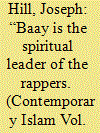

|
|
|
|
|
| Summary/Abstract |
For many, Islamic hip-hop is a contradiction. Yet many prominent rappers in Senegal have joined the Fayḍa Tijāniyya Sufi movement and communicate religious messages through their music. Rappers have contributed significantly to the Fayḍa’s rising popularity among Dakar’s youth, popularizing the Fayḍa’s esoteric teachings through their lyrics. Although many Muslims reject hip-hop as un-Islamic, the mainstream of Fayḍa adherents and its learned leaders have embraced rappers as legitimate spokespeople for the movement. Scholars discussing change and debate in Islam have often emphasized discursive argumentation that refers to foundational texts, or “sharī c a reasoning.” This article examines four other modes of religious reasoning and demonstration that Fayḍa rappers use in addition to sharī c a reasoning to present themselves as legitimate representatives of Islam: (1) truths that transcend texts and discursive reasoning; (2) the greater good, which may apparently contravene some prescription; (3) divine inspiration and sanction, for example through dreams and mystical experiences that reveal a rapper’s mission and message; (4) and “performative apologetics,” or a demonstration of exemplary piety and knowledge such that a potentially controversial practice can be reconciled with one’s religious persona. The article focuses particularly on the case of the rapper Tarek Barham. As productive as Talal Asad’s widely accepted conceptualization of Islam as a “discursive tradition” has been, this article proposes understanding Islamic truth, authority, and experience as founded not just in discourse—especially in reference to foundational texts—but in multiple complementary principles of knowing and demonstrating.
|
|
|
|
|
|
|
|
|
|
|
|
|
|
|
|
| 2 |
ID:
144898
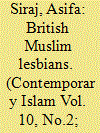

|
|
|
|
|
| Summary/Abstract |
Religiously infused ideology and doctrine on maleness/femaleness, procreation, family and the condemnatory attitude towards homosexuality has been significantly damaging for lesbians. Lesbians from a Muslim background, in particular, are forced to confront religious dogma, which advocates the punishment of non-heterosexuals leading them to repress and deny their sexuality. Despite this, an investment and belief in religion continues and remains important. In the present study the powerful appeal of religion and its influence on 5 Muslim women who identify as lesbian is explored. The study seeks to understand the way in which the women reconfigure their religious identity to address the difficulties they experience in incorporating discordant identities (faith and sexuality). The data gained indicates that rather than disconnect or reject their association with their faith they contest the condemnation of homosexuality within Islam, which in turn allows them to reclaim their Muslim identity. The alienation and ostracism the women experience from the Muslim ‘community’ has not led to their disaffection from Islam. Rather they resolutely pledge the importance of faith, practice and leading a life according to Islamic moral standards and principles. The women manage and integrate complex and layered aspects of their identity, through their commitment to Islam but also a determination to recognise an intrinsic aspect of the self that they no longer refuse to deny or suppress.
|
|
|
|
|
|
|
|
|
|
|
|
|
|
|
|
| 3 |
ID:
144900
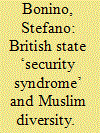

|
|
|
|
|
| Summary/Abstract |
This paper explores the securitisation of British Muslims within a global context in which tensions are reignited by the threat that Islamist terrorism, and Islam more generally, are considered to pose to the West. While Western involvement in Muslim-majority countries continues to fuel the idea of a ‘clash of civilisations’, domestic responses to terrorism and extremism take forward its rhetoric. At the heart of 15 years of wide-ranging responses lies the state ‘security syndrome’. Operating through the paradigm of risk reduction, the British state has reasserted its primary role as the distributor of security in ways that move beyond the surgical targeting of violent Islamists and their supporters and instead risk impacting on Muslims qua Muslims. Counter-terrorism and anti-extremism notions and practices that conflate security risks and cultural threats signal that Great Britain is a liberal democracy that is yet to fully foster positive inter-community relations and achieve social cohesion.
|
|
|
|
|
|
|
|
|
|
|
|
|
|
|
|
| 4 |
ID:
144899
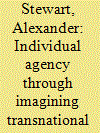

|
|
|
|
|
| Summary/Abstract |
This study examines subjective, social, and transnational aspects of conversion to Islam in modern China by examining the “conversion careers” (Gooren (J Sci Stud Relig 46(3):337–353, 2007), 2010) of seven “new Muslims” who reside in and around Xining, Qinghai Province. Examining their experiences that include pre-conversion socialization, initial encounters with Islam, study of the faith, conversion, and expressions of a new Muslim identity reveals a complex interaction between sociocultural circumstances and individual agency. Rather than gradually succumbing to local ideas of Islamic orthodoxy or passively obeying religious authorities, converts study Islamic texts, form a variety of interpretations, and express their newfound belief in various individual and collective ways that often conflict with social expectations, local Islamic norms, and moral authority of the Chinese state. Converts draw confidence to pursue these conversion careers by believing in the universality of their faith and imagining themselves as part of a transnational community that shares their interpretations of Islam. Thus, conversion to Islam can be seen as compatible with, or even the product of, modern trends of increasing rationality, individual agency, and transnational identity.
|
|
|
|
|
|
|
|
|
|
|
|
|
|
|
|
| 5 |
ID:
144901
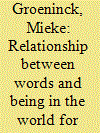

|
|
|
|
|
|
|
|